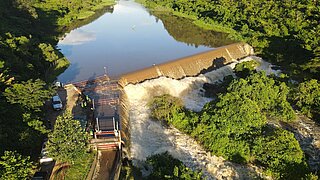Initiative for sustainable energy in Africa attracts more and more private investors

An IKI and KfW Development Bank project supplies Africa with green electricity and indirectly strengthens biodiversity. The financing of the projects is also sustainable – thanks to private investors.
Around 43 per cent of Africans have no access to electricity – that’s 600 million people, most of whom live in rural areas south of the Sahara. They cannot cool their food, switch on the light or even make an emergency call, should this be necessary. Many heat and cook using dung, wood or charcoal. This not only has a considerable negative impact on plant and animal habitats, but also on the health of those affected.
To change this situation, KfW Development Bank and the German Federal Ministry for Economic Cooperation and Development (BMZ) set up a fund in 2013 to finance renewable energy projects and thus support sustainable economic growth in sub-Saharan Africa.
Other European development finance institutions have gradually got involved, including the German government's International Climate Initiative (IKI) as an important partner. Over the course of a lengthy transformation process, the fund has developed into an independent company. Today it operates under the name Serengeti Energy, has three regional offices in Nairobi, Cape Town and Dakar, and employs 76 people – almost all of them from Africa.
Energy for 700,000 people
Serengeti Energy now operates power plants with a total capacity of 74 megawatts (MW) in Rwanda, Uganda, Sierra Leone, South Africa and Malawi. Plants for a further 260 MW are currently under development. Since its founding, the company has provided around 700,000 people with an electricity connection. In 2023 alone, Serengeti Energy’s power plants produced 283,000 MW hours of clean energy, avoiding the equivalent of 95,000 tonnes of CO2 emissions.
The primary goal of the initiative is to drive Africa’s green energy transition and improve the situation of the local population. However, at the same time, European companies are also benefiting from the construction of energy plants in Africa – European industry supplies numerous components for power plant construction, such as hydropower turbines.
Never losing sight of biodiversity
As much as hydropower and photovoltaic systems contribute to a positive climate balance, installing them always involves an intervention in natural ecosystems. The teams at Serengeti Energy therefore consider the conservation and promotion of biodiversity in all their activities. Each project includes a management plan for dealing with the local biological diversity. Impacts on biodiversity are reduced to a minimum. At the end of each project, the teams initiate measures to restore ecosystems and biodiversity.
Initiative breaks even for the first time
Sustainability is also important to Serengeti Energy when it comes to finance. After all, the initiative’s positive effects for the local population and climate protection will only be realised if the company operates in a financially sustainable manner. The good news is that this year, Serengeti Energy will break even for the first time. And by 2025, the company should turn a profit.
This is primarily made possible by the mobilisation of private capital. The company finances its projects through a combination of debt and equity instruments. Depending on the project, Serengeti Energy also works with local partners who contribute their own funds. However, these private investors in no way render the involvement of the IKI, KfW and BMZ obsolete. On the contrary: in many cases, co-investors can only be found through the security and risk minimisation that comes from public development finance institutions.
Private investors expected to take over plants completely
Serengeti Energy has developed extensive expertise in the sector and offers everything from a single source – from project development and the construction phase right through to power plant operation. Nevertheless, the company is looking for financial investors to acquire minority shareholdings in its projects in order to enable the construction of plants with greater capacity.
Over the next three years, Serengeti Energy will then once again require additional capital to put the company on a sustainable financial footing. In the medium term, however, the development finance institutions intend to sell their shares in Serengeti Energy to private investors. After all, KfW, the IKI and BMZ have not set themselves the goal of becoming major players on the renewable energy market in Africa. Their task is to initiate development that improves people’s lives while keeping climate change mitigation and biodiversity conservation in mind. As soon as Serengeti Energy is sustainably profitable, the company will step up its efforts to attract private shareholders and sell shares held by development finance institutions. KfW and the IKI can then use the freed-up capital to initiate other sustainable developments.
The link has been copied to the clipboard
Contact
IKI Office
Zukunft – Umwelt – Gesellschaft (ZUG) gGmbH
Stresemannstraße 69-71
10963 Berlin



